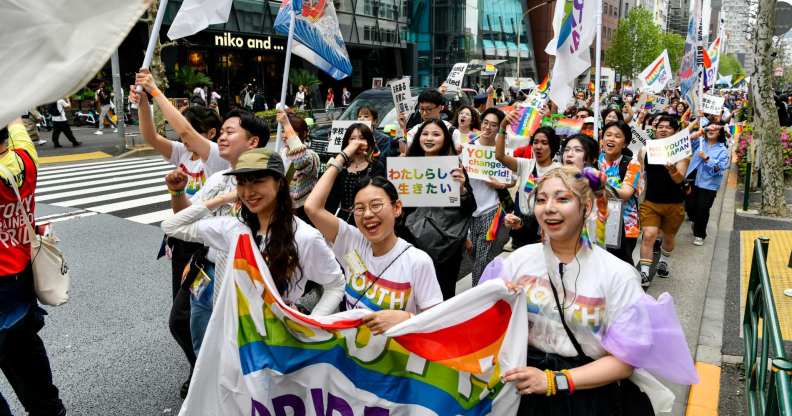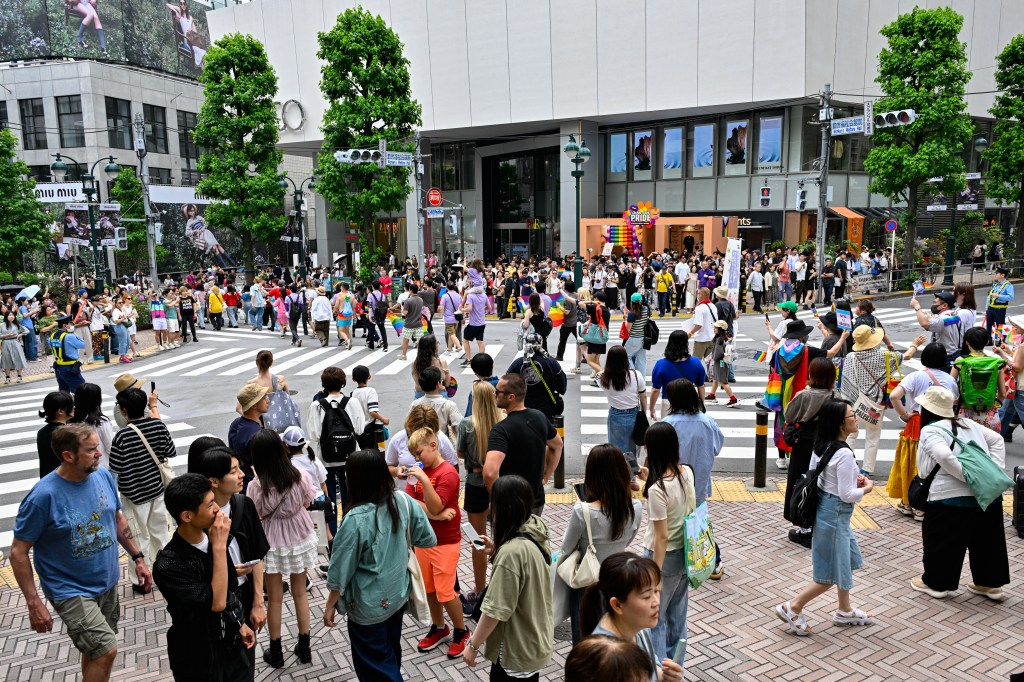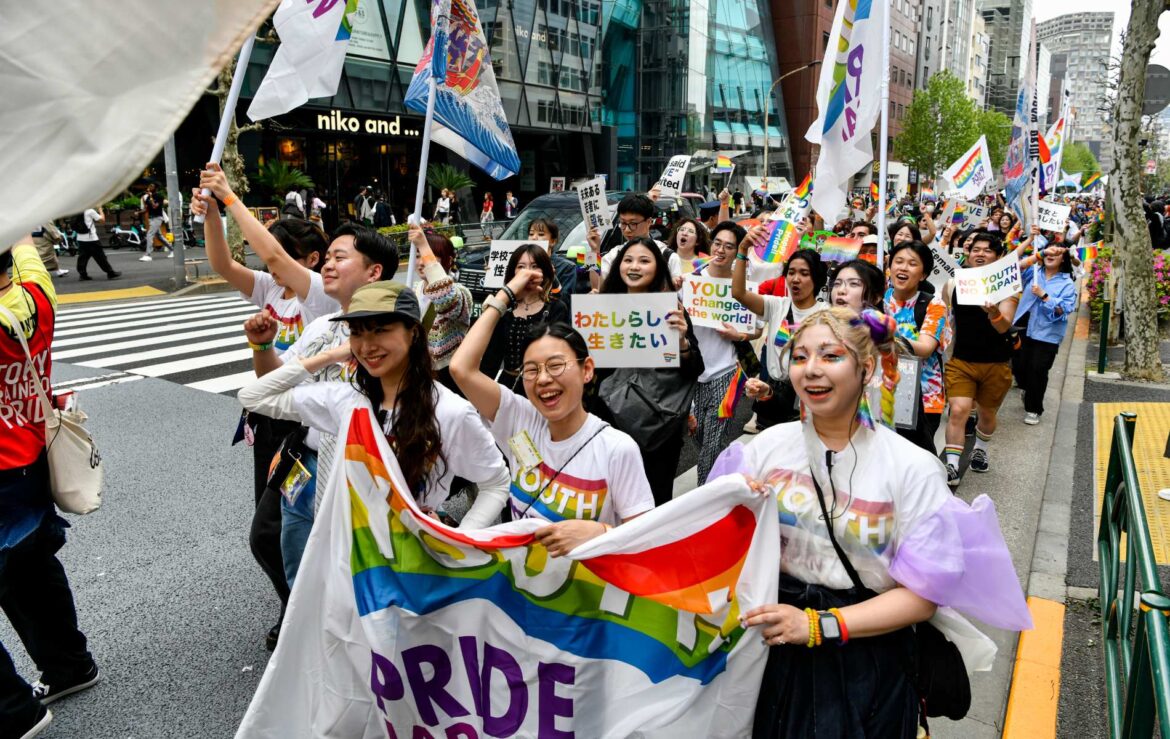
A court in Japan has decided the ban on equal marriage is constitutional (usuke Harada/NurPhoto via Getty Images)
A court in Japan has decided the ban on equal marriage is constitutional (usuke Harada/NurPhoto via Getty Images)
In a blow to the Japanese LGBTQ+ community, a court has ruled the country’s ban on same-sex marriage is constitutional.
The decision handed down by Tokyo’s High Court on Friday (28 November) outlined that Japan‘s ban on equal marriage does not violate Article 24(1) and (2) or Article 14(1) of the Constitution.
The judgement is the final ruling in a series of six high court lawsuits on same-sex marriage that were filed between 2019 and 2021 in cities including Tokyo, Osaka and Sapporo. With all the high court decisions now made, a Supreme Court ruling is expected.
Judge Ayumi Higashi said a unit between a heterosexual couple and their children is a rational legal definition of a family and the exclusion of same-sex marriage is valid. Alongside this, the court also dismissed damages of one million yen ($6,400) which was sought by each of the couples in the lawsuits.
“I’m outraged and appalled”
Speaking outside court, as quoted by the Associated Press, plaintiff Hiromi Hatogai said the decision left her “disappointed”: “Rather than sorrow, I’m outraged and appalled by the decision. Were the judges listening to us?”
Her partner, Shino Kawachi, said it was “difficult to comprehend”, adding: “What is justice? Was the court even watching us? Were they considering the next generation?”
“We only want to be able to marry and be happy, just like anyone else,” another plaintiff, Rie Fukuda, told reporters.
“I believe the society is changing. We won’t give up.”
Japan is the only G7 country that does not recognise equal marriage or offer legal protection to queer couples, whilst in wider Asia only Taiwan, Thailand and Nepal offer same-sex marriages.
 Participants for Tokyo Pride events march on the busy streets of Shibuya in Tokyo, Japan, on June 8, 2025. (Yusuke Harada/NurPhoto via Getty Images)
Participants for Tokyo Pride events march on the busy streets of Shibuya in Tokyo, Japan, on June 8, 2025. (Yusuke Harada/NurPhoto via Getty Images)
Commenting on the decision, Amnesty International criticised the ruling and said it effectively means discrimination against LGBTQ+ couples in Japan is permissible under the law.
“The court’s decision today marks a significant step backwards for marriage equality in Japan,” Amnesty International’s East Asia researcher Boram Jang said.
“The ruling in Tokyo – the final high court ruling of six lawsuits filed across the country and the only ruling to say, in effect, that discrimination against same-sex couples is constitutional – cannot be allowed to hamper progress.
“But it should serve as a warning of the reluctance to acknowledge the concept of same-sex marriage and the reality of same-sex couples living in Japan.
“While these cases work their way to the Supreme Court, the government can resolve this issue through legislation without further delay.
“The Japanese government needs to be proactive in moving towards the legalisation of same-sex marriage so that couples can fully enjoy the same marriage rights as their heterosexual counterparts.
“Japan remains the only G7 country without legal recognition for same-sex couples. The law passed by the government in 2023 to promote understanding of LGBTI people is not enough.
“There need to be solid, legal measures in place to protect same-sex couples and the LGBTI community in Japan from all forms of discrimination.”
Previously, in 2024, Sapporo District Court in northern Japan came to an opposite conclusion and ruled the civil code which limits marriage to between a man and a woman is “unconstitutional [and] discriminatory”.
“Enacting same-sex marriage does not seem to cause disadvantages or harmful effects,” the High Court said in its ruling, adding it was “strongly expected” that parliament would “institutionalise an appropriate law” in the future.
“Living in accordance with one’s gender identity and sexual orientation is an inalienable right rooted in important personal interests,” the court also said.
The Sapporo decision followed prior decisions by courts in Nagoya and Tokyo – a separate lawsuit to the one detailed above – which also declared the ban unconstitutional.
What happens next?
Now that each of the six high court cases are completed, Japan’s highest court – the Supreme Court of Japan – is expected to manage the appeals and make a final decision on the matter.
Research has previously shown that most of the Japanese population is in favour of legalising same-sex marriage, with an opinion poll from 2023 revealing that two-thirds of Japanese people believe equal marriage should be legally recognised.
However, the legalisation of same-sex marriage still looks set to be a long way off, with Japan’s first female prime minister, Sanae Takaichi, has expressed opposition to same-sex marriage, describing it as a “very difficult problem” in the past.


AloJapan.com